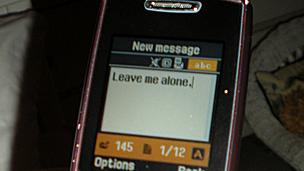Cyber-stalking should be a criminal offence, MPs say
- Published

Cyber-stalking should be made a criminal offence, says a group of MPs calling for an overhaul of the law.
The MPs also say police and prosecutors must give all stalking complaints greater priority.
Data released by probation union Napo shows 2.2% of the 53,000 stalking incidents recorded in England and Wales in 2009 led to a jail term.
The charity Network for Surviving Stalking says the internet is "another weapon in the stalker's armoury".
More than 80 MPs from all parties, backed by anti-stalking charities, are calling for a review of the Protection from Harassment Act 1997.
It is the legislation currently used to prosecute stalkers, but does not define stalking - or cyber-stalking - as a specific offence, and talks only of "harassment".
Unreported cases
Assistant general secretary of Napo Harry Fletcher said it was "extremely worrying" that cyber-stalking was not a specific offence, despite being "prevalent across England and Wales".
Alexis Bowater, chief executive of the Network for Surviving Stalking, told the BBC: "What all the experts will tell you is that the internet is just another weapon in the stalker's armoury.
"It facilitates it - it's much easier to approach someone online than to go to their house or send them a letter."
The figures from Napo show that of 53,000 stalking allegations recorded in 2009, there were 6,581 convictions. Of those convicted, 18.5% were jailed.
Mr Fletcher said the actual number of incidents was probably 10 times the number reported to police, but many people were not coming forward.
"Many victims report that complaints are not investigated thoroughly by the police and prosecutors," he said.
"Stalking must be taken seriously... It destroys lives and indeed can lead to loss of life."
Ms Bowater said the 1997 act was generally accepted as being one of the best pieces of anti-stalking legislation in the world, but it could still be improved upon.
"Methods of stalking have changed in the past 14 years and it's right to ask if it's still fit for purpose," she said.
"But one of the problems is that stalkers are very devious and we don't want to come up with a stalkers' charter. If you make legislation too explicit they'll find a way around it."
Speakers at an event on Wednesday - chaired by Plaid Cymru's Parliamentary Leader Elfyn Llwyd - will include Carol Faruqui and Tricia Bernal, who founded Protection Against Stalking after their daughters were killed.
The event aims to give guidance to MPs whose constituents are being stalked.
According to the latest crime surveys for England, Wales and Scotland, some 1.4 million people were stalked or harassed in 2009-10.
Northern Ireland is covered by the Protection from Harassment (Northern Ireland) Order 1997 which was made under the act.
- Published28 August 2010